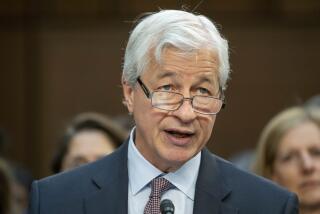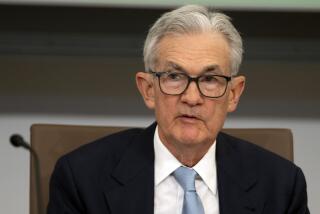Volcker Issues Warning on Deficits : Says Shortfalls in Trade, U.S. Budget Can Be Contained
- Share via
Federal Reserve Board Chairman Paul A. Volcker told an audience of Los Angeles business executives Tuesday that “we’ve come a long way toward setting the stage for a period of sustained growth,” but he warned of budget and trade deficits as “dangers and risks that I see that threaten our prosperity.”
Separately, a top economist predicted at the same business outlook conference, sponsored by the Los Angeles Area Chamber of Commerce, that the nation must endure three more quarters of sluggish economic growth, accompanied by stable prices and a slight decline in interest rates. Other industry leaders foresaw sluggish retail sales, an increase in tourism, an overall stable construction outlook and improved aerospace and defense employment.
Volcker said that “I think it’s well within our collective capacity to contain the strains in our economy, but it’s going to take more than words.”
Because of the widening trade deficit created in part by the strong dollar, U.S. manufacturers continue to lose market share to foreign competitors, Volcker said. “We have in effect been creating manufacturing jobs in Japan, Europe and elsewhere,” he said.
But the trade deficit and the related influx of foreign capital have both bad and good implications for the U.S. economy, he added.
The flow of foreign capital to the United States has kept the dollar strong, which has helped to boost cheap imports, he said. At the same time, the foreign investment has kept U.S. capital markets “in reasonable balance” in light of the large budget deficit and the low savings rate, and that has helped to keep interest rates low.
‘Unsustainable’ Situation
“The situation is unsustainable,” Volcker warned. “The sooner we get our house in order so that our financial markets are not hostage to foreign capital, the better.”
Volcker also noted that the Fed has been pursuing a “generally accommodative policy” in monetary growth. The higher-than-targeted growth of M1, the most basic measure of the money supply that includes cash in circulation and checking deposits, hasn’t been inflationary because of the increasing importance of other monetary targets, lower interest rates and the strong dollar, which creates competition and incentives to cut costs.
In another presentation to the conference, John D. Paulus, managing director and chief economist of Morgan Stanley & Co., said inflation should remain under control during 1986 because the U.S. economy will continue to plow through its “growth recession,” a period of positive but sluggish economic growth.
Paulus forecast real economic growth of 2% to 2.5% during the current quarter and the first half of 1986. Interest rates will decline “moderately” during that period, followed by a slight rebound in the second half of the year, when real economic growth will jump to 4%, he said.
“It’s quite unlikely that we’re going to come surging out of this growth recession with a full head of steam,” he said.
Economic growth slowed in recent months because the strong dollar “just clobbered our goods-producing industries,” he said. Spending by consumers offset the decline, but, in the process, consumers rolled up record debt and greatly reduced their savings, he said.
Now, with the declining dollar, goods-producing industries will rebound, but the consumer will retrench as import prices rise, Paulus said.
More to Read
Inside the business of entertainment
The Wide Shot brings you news, analysis and insights on everything from streaming wars to production — and what it all means for the future.
You may occasionally receive promotional content from the Los Angeles Times.










